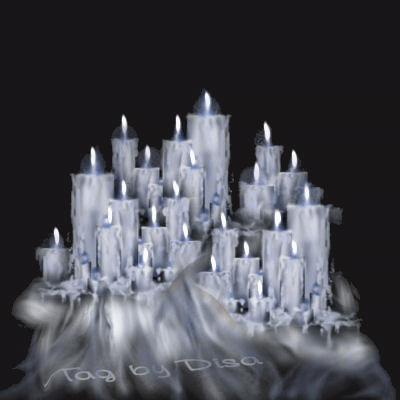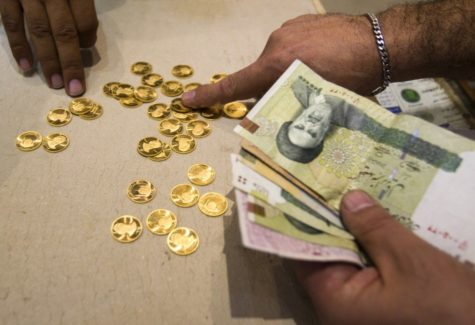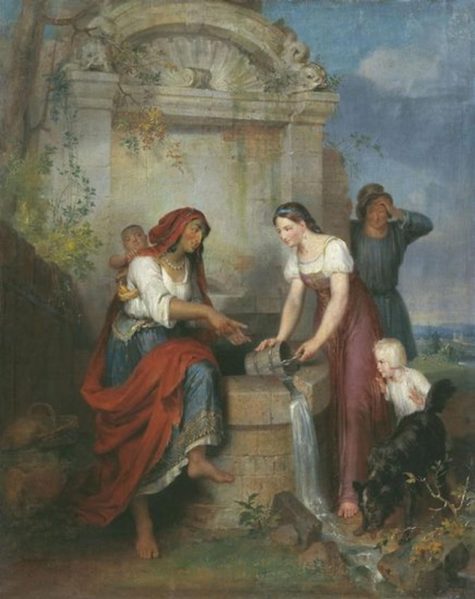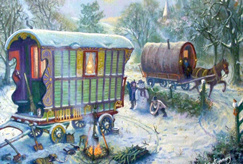Gold
Out With The Old
 If you think deeply about the start of any period of bad luck, you will find that there is some object that you acquired round about then or that you used or wore quite a lot. Maybe it is something that brings back recollections of an unhappy event. It can be an ornament, an item of clothing, a photograph, or even a kitchen utensil.
If you think deeply about the start of any period of bad luck, you will find that there is some object that you acquired round about then or that you used or wore quite a lot. Maybe it is something that brings back recollections of an unhappy event. It can be an ornament, an item of clothing, a photograph, or even a kitchen utensil.
Place the said object near the back door of the house. Then, using a broom, and starting at the top of the house or in the room furthest from the back door, sweep each room in turn, working in a counter clockwise direction. As you work, visualize darkness being swept away in front of you. The darkness is black heavy clouds of bad luck. It can’t resist your broom. While you sweep, say,
“I banish the dark clouds from my home, bad luck be gone, there is no place here for you. Be gone, be gone, be gone!”
Any dust can be swept on to a shovel and taken with you as you go. Do each room in turn until you reach the back door, then put all the sweepings into a bag outside. Take the object previously mentioned and break or tear it, venting all your anger and frustration. Put the pieces into the bag with the dust. Sprinkle the contents with salt, saying,
“By this salt, cleansing gift of the earth, I render you powerless.”
Now bury the bag. If it is at all possible, bury it at a crossroads or by running water, but if this is not practical bury it in the garden or at the bottom of the rubbish bin. Before covering the bag with earth, or rubbish, sprinkle it with salt, making a pattern of a cross within a circle, saying,
“By this salt, by this sign you are gone from my life.”
Now reversing the order of the rooms, from the back door to the top of the house walk round each room clockwise with a lighted candle, preferably colored pink or gold, and a lighted incense stick perfumed amber or rose (or a scent that you really love). Alternatively if there is a particular perfume (or essential oil) that makes you feel happy, use that. As you walk, say,
“I bring light, joy, luck, and love into every corner of my home and life.”
Visualize each room being filled with bright golden light, every corner bursting with hope and joy. When you have done, return to the room most often used and leave the candle and incense to burn out naturally. Take time to enjoy the new feeling of happiness filling your home.
From: Gypsy Magic
by Patrinella Cooper
Wealthy Week
On a Sunday evening, burn a gold candle surrounded by piles of loose change. It is important not to count the cash. If there are so few coins you cannot help but notice, cover them with a handkerchief. Watching the candle flame, say:
“Thank you for the money I have already received from the invisible world.”
Leave the candle to burn down and extinguish itself. Afterward gather up the coins. You will need them for the next evening’s spell.
On Monday burn a white candle in the same way, adding to the heap of coins any more you have accumulated throughout the day. Repeat words of thanks for money already received from the invisible world.
On Tuesday use a pink candle and add to the coin collection the loose change the day has brought you. Speak the magic words again.
Continue with the words and the same coins, adding daily to the pile. Use a red candle on Wednesday, a green candle on Thursday, a blue candle on Friday, and on Saturday a green candle.
Stash away your cash and reserve it for money spells. The more coins you accumulate, the greater the power of attraction.
(Of course, you can also throw the coins into your purse.)
Found in:
The Good Spell Book by Gillian Kemp
Gypsy Pouches and Mojo Bags
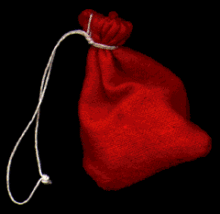 Magickal pouches are found universally. Australian aboriginals, Amerindian shamans, Voodoo Bokos, African medicine men, European wisewomen – all employ pouches stuffed with various ingredients that they feel bring health, wealth, luck (good or bad), and/or protection. They may be called wanga, gris-gris, mojo bags, or whatever.
Magickal pouches are found universally. Australian aboriginals, Amerindian shamans, Voodoo Bokos, African medicine men, European wisewomen – all employ pouches stuffed with various ingredients that they feel bring health, wealth, luck (good or bad), and/or protection. They may be called wanga, gris-gris, mojo bags, or whatever.
The Gypsies, too, make and carry such items. Depending on the purpose, so do the contents vary. The name for a Gypsy pouch is “putsi,” the real meaning of which is “pocket.”
For love, the Romanis make little bags of red silk, which they fill with rose petals, acorns, a piece of amber, cinnamon, two cloves, a bean, a piece of orris root, and a silver or gold coin. This is worn next to the skin. Occasionally they use small chamois leather pouches rather than silk.
Some Gypsies also include such items as a small bird’s feather, a piece of lemon peel, lavender, a wedding ring (perhaps the mother’s or grandmother’s), and a small piece of coal. Many Gypsies have two pouches. One is the silk one, which hangs around their neck, and the other is the leather putsi, which they hang from their belt. Into this second one it is easy to slip any new item that is spotted and recognized to be of value. I do this myself. Always keep your eyes open … you never know when you might spot something that could be a very powerful amulet.
Urgent Money Spell
The Romanies say that when money is urgently needed by a certain date, this spell works wonders. One thing to remember: it must be performed at the witching hour of midnight.
Take one white votive (or tea light) candle to represent each $100 or $1,000 that you critically need. Stand them on a plate you often eat from.
At a quarter to midnight, sit in a room with no electric lights. Light a gold or silver, green or white candle (not one of those representing the needed money). This is the candle that will give power to the “money” votive candles and will enable you to see what you are doing.
Now work your magic. Pray for a circle of gold light to be placed around you for protection and for a circle of blue light to be placed around you for healing.
Pick up a votive candle and light it from the main candle flame. As you do so, say that the votive you are lighting represents the $100 or $1000 you need. Place on the plate to begin a circle of “money” candles.
Light each votive, and say the same words for each, until the circle is complete.
Say a prayer explaining that you are not being greedy; that the money is necessary. Leave the candles to burn out of their own accord. The money will soon start winging its way to you.
Found in:
The Good Spell Book
Gypsy Fortune Telling
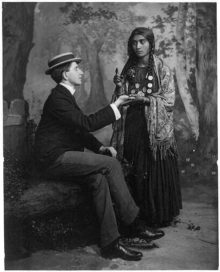 Gypsy women, as long as we have known anything of Gypsy history, have been arrant fortune-tellers. They plied fortune-telling about France and Germany as early as 1414, the year when the dusky bands were first observed in Europe, and they have never relinquished the practice. There are two words for fortune-telling in Gypsy, bocht and dukkering. Bocht is a Persian word, a modification of, or connected with, the Sanscrit bagya, which signifies ‘fate.’ Dukkering is the modification of a Wallaco-Sclavonian word signifying something spiritual or ghostly. In Eastern European Gypsy, the Holy Ghost is called Swentuno Ducos.
Gypsy women, as long as we have known anything of Gypsy history, have been arrant fortune-tellers. They plied fortune-telling about France and Germany as early as 1414, the year when the dusky bands were first observed in Europe, and they have never relinquished the practice. There are two words for fortune-telling in Gypsy, bocht and dukkering. Bocht is a Persian word, a modification of, or connected with, the Sanscrit bagya, which signifies ‘fate.’ Dukkering is the modification of a Wallaco-Sclavonian word signifying something spiritual or ghostly. In Eastern European Gypsy, the Holy Ghost is called Swentuno Ducos.
Gypsy fortune-telling is much the same everywhere, much the same in Russia as it is in Spain and in England. Everywhere there are three styles – the lofty, the familiar, and the homely; and every Gypsy woman is mistress of all three and uses each according to the rank of the person whose vast she dukkers, whose hand she reads, and adapts the luck she promises.
There is a ballad of some antiquity in the Spanish language about the Buena Ventura, a few stanzas of which translated will convey a tolerable idea of the first of these styles to the reader, who will probably with no great reluctance dispense with any illustrations of the other two:
Late rather one morning
In summer’s sweet tide,
Goes forth to the Prado
Jacinta the bride:
There meets her a Gypsy
So fluent of talk,
And jauntily dressed,
On the principal walk.
“O welcome, thrice welcome,
Of beauty thou flower!
Believe me, believe me,
Thou com’st in good hour.”
Surprised was Jacinta;
She fain would have fled;
But the Gypsy to cheer her
“O cheek like the rose-leaf!
O lady high-born!
Turn thine eyes on thy servant,
But ah, not in scorn.
“O pride of the Prado!
O joy of our clime!
Thou twice shalt be married,
And happily each time.
“Of two noble sons Thou shalt be the glad mother,
One a Lord Judge,
A Field-Marshal the other.”
Gypsy females have told fortunes to higher people than the young Countess Jacinta: Modor – of the Gypsy quire of Moscow – told the fortune of Ekatarina, Empress of all the Russias. The writer does not know what the Ziganka told that exalted personage, but it appears that she gave perfect satisfaction to the Empress, who not only presented her with a diamond ring – a Russian diamond ring is not generally of much value – but also her hand to kiss.
The writer’s old friend, Pepíta, the Gitana of Madrid, told the bahi of Christina, the Regentess of Spain, in which she assured her that she would marry the son of the King of France, and received from the fair Italian a golden ounce, the most magnificent of coins, a guerdon which she richly merited, for she nearly hit the mark, for though Christina did not marry the son of the King of France, her second daughter was married to a son of the King of France, the Duke of M-, one of the three claimants of the crown of Spain, and the best of the lot; and Britannia, the Caumli, told the good luck to the Regent George on Newmarket Heath, and received ‘foive guineas’ and a hearty smack from him who eventually became George the Fourth – no bad fellow by the by, either as regent or king, though as much abused as Pontius Pilate, whom he much resembled in one point, unwillingness to take life – the sonkaypè or gold-gift being, no doubt, more acceptable than the choomapé or kiss-gift to the Beltenebrosa, who, if a certain song be true, had no respect for gorgios, however much she liked their money:
Britannia is my nav;
I am a Kaulo Camlo;
The gorgios pen I be
A bori chovahaunie;
And tatchipen they pens,
The dinneleskie gorgies,
For mande chovahans
The luvvu from their putsies.
Britannia is my name;
I am a swarthy Lovel;
The Gorgios say I be
A witch of wondrous power;
And faith they speak the truth,
The silly, foolish fellows,
For often I bewitch
The money from their pockets.
Fortune-telling in all countries where the Gypsies are found is frequently the prelude to a kind of trick called in all Gypsy dialects by something more or less resembling the Sanscrit kuhana; for instance, it is called in Spain jojana, hokano, and in English hukni. It is practised in various ways, all very similar; the defrauding of some simple person of money or property being the object in view. Females are generally the victims of the trick, especially those of the middle class, who are more accessible to the poor woman than those of the upper. One of the ways, perhaps the most artful, will be found described in another chapter (What is The Hukni? and What is Cauring?)
From: Romano Lavo-Lil
Meet With Success
 This is a “commanding” spell and will place you on the threshold of success. It may also be used to increase your personal power before an important meeting.
This is a “commanding” spell and will place you on the threshold of success. It may also be used to increase your personal power before an important meeting.
Have in your mind a clear idea of what it is that you want to succeed with. Light a blue candle in front of a mirror. Sit at the mirror and stare into your own eyes in search of your soul. Ask for a circle of gold light to be placed around you for protection and a circle of blue light to be placed around you for healing. Repeat your Christian name (or names) twenty-one times. Then speak your wish and repeat it twenty-one times. Blow out the candle and await success.
From: The Good Spell Book
Another Old Gypsy Trick
The Gypsy has some queer, old-fashioned gold piece; this she takes to some goldsmith’s shop, at the window of which she has observed a basin full of old gold coins, and shows it to the goldsmith, asking him if he will purchase it. He looks at it attentively, and sees that it is of very pure gold; whereupon he says that he has no particular objection to buy it; but that as it is very old it is not of much value, and that he has several like it.
“Have you indeed, Master?” says the Gypsy; “then pray show them to me, and I will buy them; for, to tell you the truth, I would rather buy than sell pieces like this, for I have a great respect for them, and know their value: give me back my coin, and I will compare any you have with it.”
The goldsmith gives her back her coin, takes his basin of gold from the window, and places it on the counter. The Gypsy puts down her head, and pries into the basin. “Ah, I see nothing here like my coin,” says she. “Now, Master, to oblige me, take out a handful of the coins and lay them on the counter; I am a poor, honest woman, Master, and do not wish to put my hand into your basin. Oh! if I could find one coin like my own, I would give much money for it; barributer than it is worth.”
The goldsmith, to oblige the poor, simple, foreign creature (for such he believes her to be), and, with a considerable hope of profit, takes a handful of coins from the basin and puts them upon the counter.
“I fear there is none here like mine, Master,” says the Gypsy, moving the coins rapidly with the tips of her fingers. “No, no, there is not one here like mine – kek yeck, kek yeck – not one, not one. Stay, stay! What’s this, what’s this? So se cavo, so se cavo? Oh, here is one like mine; or if not quite like, like enough to suit me. Now, Master, what will you take for this coin?”
The goldsmith looks at it, and names a price considerably above the value; whereupon she says: “Now, Master, I will deal fairly with you: you have not asked me the full value of the coin by three three-groats, three-groats, three-groats; by trin tringurushis, tringurushis, tringurushis. So here’s the money you asked, Master, and three three-groats, three shillings, besides. God bless you, Master! You would have cheated yourself, but the poor woman would not let you; for though she is poor she is honest”: and thus she takes her leave, leaving the goldsmith very well satisfied with his customer – with little reason, however, for out of about twenty coins which he laid on the counter she had filched at least three, which her brown nimble fingers, though they seemingly scarcely touched the gold, contrived to convey up her sleeves.
This kind of pilfering is called by the English Gypsies cauring, and by the Spanish ustilar pastesas, or stealing with the fingers. The word caur seems to be connected with the English cower, and the Hebrew kãra, a word of frequent occurrence in the historical part of the Old Testament, and signifying to bend, stoop down, incurvare.
From: Romano Lavo-Lil
An Old Gypsy Trick
The Gypsy makes some poor simpleton of a lady believe that if the latter puts her gold into her hands, and she makes it up into a parcel, and puts it between the lady’s feather-bed and mattress, it will at the end of a month be multiplied a hundredfold, provided the lady does not look at it during all that time. On receiving the money she makes it up into a brown paper parcel, which she seals with wax, turns herself repeatedly round, squints, and spits, and then puts between the feather-bed and mattress – not the parcel of gold, but one exactly like it, which she has prepared beforehand, containing old halfpence, farthings, and the like; then, after cautioning the lady by no means to undo the parcel before the stated time, she takes her departure singing to herself:
O dear me! O dear me!
What dinnelies these gorgies be.
The above artifice is called by the English Gypsies the hukni, and by the Spanish hokhano baro, or the great lie. Hukni and hokano were originally one and the same word; the root seems to be the Sanscrit huhanã, lie, trick, deceit.
From: Romano Lavo-Lil
Home Sweet Home Spell

Just as Romanies blessed and protected their vardos, so you can bless your new home and protect it from burglary and fire.
- Sprinkle salt around the perimeter
- Or plant garlic around the boundary.
- You can also pray for a circle of gold light for protection and a circle of blue light for healing to be placed around the home.
Disruptive neighbors who upset the harmony of your home can be tamed quite simply. Place small hand mirrors on windowsills facing their home. These reflect back whatever they are sending out to you if you say, “Return to sender.” If no anger is attached to your actions, your neighbors will respond to your influence without realizing why.
From: The Good Spell Book

